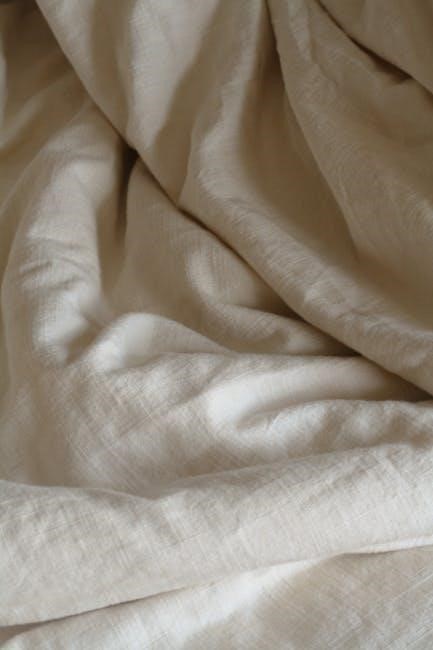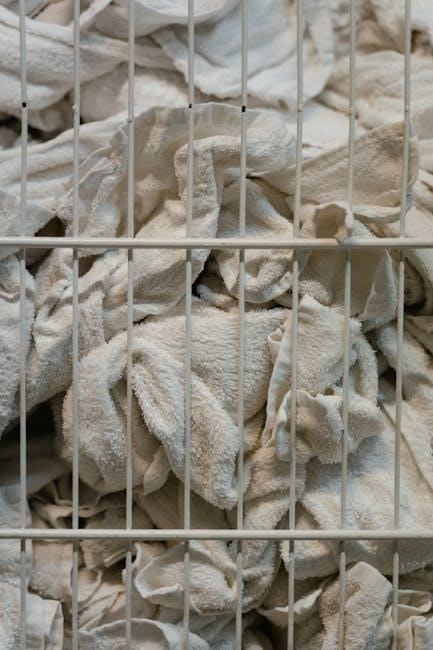Importance of Cold Water for Washing 100% Cotton
Washing 100% cotton in cold water prevents shrinkage, maintains vibrant colors, and reduces fabric wear. It also minimizes energy consumption, making it eco-friendly and gentle on textiles.
Why Cold Water is Recommended
Cold water is recommended for washing 100% cotton because it prevents shrinkage, maintains vibrant colors, reduces fabric wear, and is eco-friendly. Lower temperatures preserve the natural fibers, extend fabric lifespan, and minimize energy consumption, making it a gentle and sustainable choice for cotton care.

Hand Washing vs. Machine Washing
Hand washing is gentle and prevents shrinkage, while machine washing is convenient but risks fabric damage. Choose based on fabric sensitivity and care requirements.
Pros and Cons of Hand Washing

Hand washing is a gentle method that prevents shrinkage and preserves colors, ideal for delicate or sensitive fabrics. It allows precise control over water temperature and detergent use, reducing fabric stress. However, it is time-consuming, labor-intensive, and may not remove heavy stains as effectively as machine washing. Hand washing is recommended for treasured or sensitive 100% cotton items to maintain their quality and longevity, ensuring they remain soft and vibrant for years.

Pros and Cons of Machine Washing
Machine washing is efficient and convenient, ideal for heavily soiled 100% cotton items. It saves time and effort compared to hand washing. However, it may cause shrinkage, especially in hot water, and can be harsh on fabrics if not using a gentle cycle. Machine washing is suitable for everyday cotton items but requires careful settings to preserve fabric quality. Using cold water and a delicate cycle minimizes damage, making it a practical choice for most cotton care needs while maintaining cleanliness and convenience effectively.

Preventing Shrinkage in 100% Cotton Fabrics
Wash 100% cotton in cold water, avoid high heat, and refrain from machine drying. Air drying prevents shrinkage and maintains fabric integrity effectively.
Tips to Avoid Shrinking
Wash 100% cotton fabrics in cold water to prevent shrinkage, as heat causes fibers to contract. Avoid machine drying and opt for air drying instead. Use mild detergents and gentle cycles to protect fibers. Turn clothes inside out to reduce friction and pilling. Avoid overloading the washing machine to minimize abrasion. Lay clothes flat to dry or reshape while damp to maintain their original dimensions. Follow care labels for specific instructions, as some fabrics may require special handling. Ironing while slightly damp can help restore shape without causing further shrinkage.

Washing Colored 100% Cotton Fabrics
Wash colored 100% cotton fabrics inside out in cold water to preserve vibrancy. Use mild detergents and avoid bleach to prevent fading. Air dry to maintain color integrity.

How to Prevent Color Fading
To prevent color fading in 100% cotton fabrics, wash garments inside out in cold water using a mild detergent. Avoid bleach and harsh chemicals. Soaking colored fabrics in cold salt water before washing can enhance color fastness. Washing similar colors together and avoiding overloading the washing machine also helps reduce fading. Air drying instead of using a tumble dryer further preserves color vibrancy. For delicate or brightly colored items, consider hand washing to minimize color loss and maintain fabric quality.

Drying Methods for 100% Cotton
Air drying 100% cotton is recommended to prevent shrinkage and maintain fabric texture. Lay items flat or hang to dry, avoiding direct sunlight and machine drying.
Why Air Drying is Preferred
Air drying is the best method for 100% cotton fabrics as it prevents shrinkage, maintains texture, and avoids damage caused by machine heat. Lay items flat or hang them in a well-ventilated area, away from direct sunlight. This gentle approach preserves the fabric’s natural softness and elasticity. Avoid tumble drying, as high heat can cause fibers to break down and lead to shrinkage. Air drying also reduces energy consumption, making it an eco-friendly choice. Always reshape the fabric while still damp to maintain its original form.

Role of Fabric Softeners in Washing Cotton
Fabric softeners can leave residue on cotton, reducing its natural softness and breathability. It’s best to avoid them for maintaining 100% cotton items.
Should You Use Fabric Softeners?
Fabric softeners are generally not recommended for washing 100% cotton. They can leave a residue on fibers, reducing breathability and softness over time. This residue may also affect absorbency, especially in towels. Instead, consider using vinegar during the rinse cycle to naturally soften the fabric without harmful chemicals. For optimal results, rinse thoroughly and avoid fabric softeners to maintain the natural texture and quality of 100% cotton items. Air drying further enhances softness and prevents damage from heat.
Storage Tips for 100% Cotton Items
Store 100% cotton items in a clean, dry place. Use breathable containers or cotton bags to maintain fabric quality. Avoid plastic to prevent moisture buildup. Fold instead of hanging to maintain shape and prevent stretching. Keep away from direct sunlight to avoid fading.
How to Maintain Fabric Quality
Always clean and dry items before storage. Use breathable containers or cotton bags to prevent moisture. Fold items neatly to avoid creases and stretching. Store in a cool, dry place away from direct sunlight to protect colors. Avoid using plastic bags, as they trap moisture. Consider adding a natural moth repellent like lavender sachets. Regularly inspect stored items for signs of damage or pests. These practices ensure your 100% cotton fabrics remain soft, vibrant, and intact for years.
Pre-Treatment of Stains on Cotton
Apply a small amount of mild detergent directly to the stain. Gently agitate with your fingers or a soft brush before washing in cold water to ensure removal;
Effective Methods for Stain Removal
Pre-treat stains on 100% cotton by applying a mild detergent directly to the affected area. Gently agitate with your fingers or a soft brush to work in the detergent. For stubborn stains, soak the garment in cold water for 15–30 minutes before washing. Avoid using bleach or harsh chemicals, as they can damage the fabric or cause discoloration. Rinse thoroughly with cold water to remove all detergent residue. This method ensures effective stain removal while preserving the quality of the cotton fabric.
Common Mistakes to Avoid When Washing Cotton
Common mistakes include using hot water, over-drying, and employing harsh detergents. These can cause shrinkage, fading, and fabric weakening. Stick to cold water and gentle cycles.
Do’s and Don’ts
Always wash 100% cotton in cold water to prevent shrinkage and fading. Use a mild detergent and avoid bleach. For machine washing, select a gentle cycle; Hand washing is ideal for delicate items. Avoid overloading the washing machine to prevent fabric stress. Do not tumble dry; air drying preserves fabric integrity. Iron on a low setting if necessary. Follow care labels for specific instructions. Avoid soaking colored fabrics too long to maintain vibrancy. Regular washing in cold water keeps cotton soft and durable over time.
Special Care for Specific Cotton Items
Bedding: Wash in cold water with mild detergent; avoid fabric softeners. Towels: Use gentle cycles and avoid bleach to maintain absorbency. Clothing: Turn inside out before washing to prevent fading and pilling.
Caring for 100% Cotton Bedding, Towels, and Clothing
Bedding: Wash in cold water with mild detergent; avoid fabric softeners. Towels: Use gentle cycles and avoid bleach to maintain absorbency. Clothing: Turn inside out before washing to prevent fading and pilling. For bedding, dry naturally or on a low heat setting to prevent shrinkage. Towels benefit from air drying to retain softness. Clothing should be laid flat to dry, especially for delicate items like shirts. These practices ensure longevity, comfort, and maintain the quality of 100% cotton items while keeping them fresh and durable.
Eco-Friendly Washing Tips for Cotton
Use cold water and eco-friendly detergents to reduce energy consumption and minimize environmental impact; Avoid bleach and fabric softeners, opt for mild detergents, and wash full loads.
Using Eco-Friendly Detergents and Methods
Opt for eco-friendly detergents that are free from harsh chemicals and phosphates, which can harm the environment. Choose cold water cycles to reduce energy consumption and prevent fabric shrinkage. Avoid using bleach or fabric softeners, as they can damage cotton fibers and release harmful substances. Line-drying instead of using a dryer saves energy and preserves fabric quality. Wash full loads to minimize water usage. Eco-certified detergents are ideal for maintaining both fabric integrity and environmental sustainability.
Properly washing 100% cotton ensures durability and comfort. Use cold water, gentle detergents, and avoid fabric softeners. Air-dry and check labels for specific care instructions.
Best Practices for Washing 100% Cotton
For optimal care, wash 100% cotton in cold water using a mild detergent to prevent shrinkage and color fading. Avoid fabric softeners, as they reduce breathability. Air-drying is preferred to maintain fabric quality and prevent shrinkage. Always check the care label for specific instructions, as some items may require hand washing. Washing similar colors together helps preserve vibrancy. Avoid overloading the washing machine to prevent fabric stress. Following these guidelines ensures your cotton items remain soft, durable, and retain their original appearance for a longer period.
